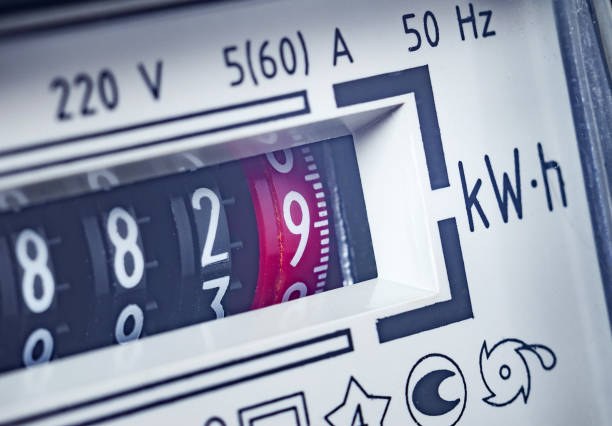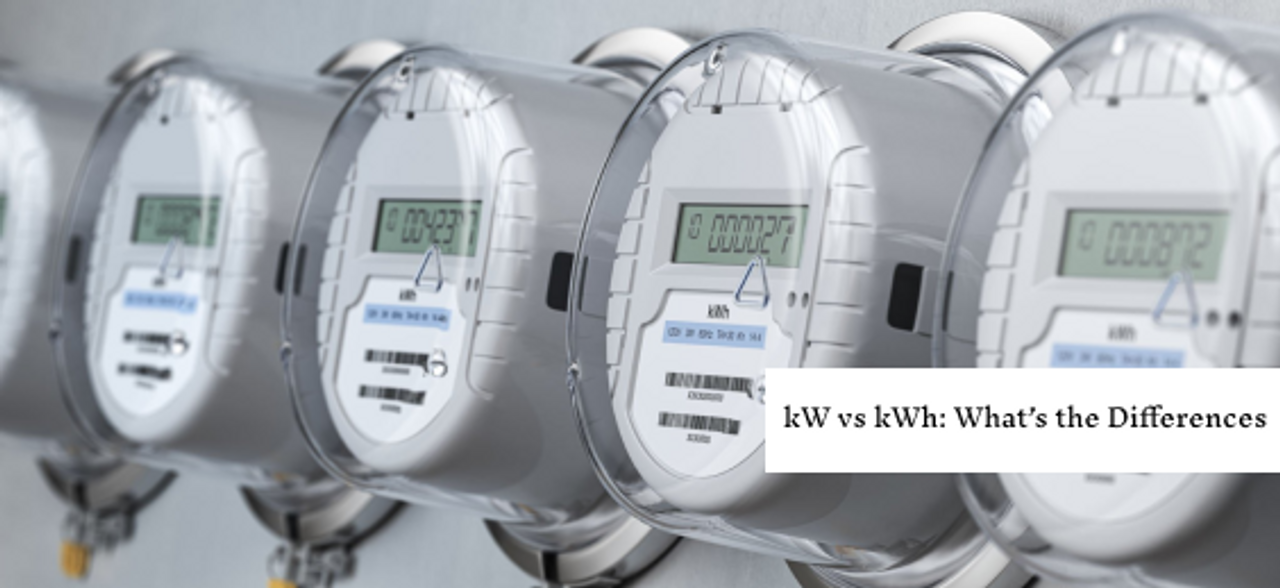kW Vs. kWh: What’s the Difference?
Most people assume kilowatt vs. kilowatt hour is the same thing. Although both measuring units are related, they are used for measuring different things. The major difference between kW and kWh is that kW measures the rate at which a particular device consumes electricity while kWh measures the number of electricity consumed, the energy, and the capacity of an appliance to consume energy. Understanding the terms is crucial to helping you monitor and manage your energy consumption rate. With this article, you will gain clarity about their core differences and you can use it to help you understand various aspects of energy usage.
The Difference Between kW Vs. kWh
Both kW and kWh are units of measuring electricity, which can be confusing when telling them apart. The notable distinction between the two is that kW measures the rate or the instantaneous at which a device utilizes electricity. kWh quantifies the total electricity utilized within a given period.
Another key factor in understanding the kW and kWh units, you must consider time. kWh quantifies the amount of energy an electrical appliance consumes in kilowatt time hours.
For instance, if you are charging your electric vehicle using a 30kW charger for two hours, it will then consume 60 kWh of energy. The formula for computing this is: kW x hours = kWh. Additionally, kWh also measures the amount of electricity that is capable of being stored.
If you are choosing a solar power system for your home, you should first consider the cumulative number of wattages for all the appliances and electric devices, including the HVAC system. Understanding the total wattage will enable you to select the best solar power system that will adequately supply power to your home. In addition, you should account for the surge power for charging your devices. Usually, the wattage requirements are displayed on most appliances.
However, if the power requirements on your device are not displayed in wattage, you can convert it. For instance, if the power ratings are displayed on voltage or amps, you can use the method below to convert to wattage.
Watts (W) = Volts (V) x Amps (A)
kW and kWh Conversion Table
First, to convert watts to kilowatts, multiply it by one thousand. Here’s a conversion table to illustrate the conversion.
|
Power |
Energy | ||
| 1000 Watts(W) | 1 Kilowatt(kW) | 1000 Wh | 1 kilowatt-hour(kWh) |
| 1000 kW | 1 Megawatt(MW) | 1000 kWh | 1 Megawatt-hour(MWh) |
| 1000 MW | 1 Gigawatt(GW) | 1000 MWh | 1 Gigawatt-hour(GWh) |
| 1000 GW | 1 Terawatt(TW) | 1000 GWh | 1 Terawatt-hour(TWh) |
To calculate kW to kWh, you can use this example. 1 kW used for 5 hours will result in 5 kWh. Or 5 kWh = 1 kW x 5 Hours.
Check the table below for further illustration:
| Kilowatt | Time | Kilowatt Hours |
| 1 kW | 1 Hour | 1 kWh |
| 2 kW | 2 Hours | 4 kWh |
| 5 kW | 3 Hours | 15 kWh |
| 7 kW | 4 Hours | 28 kWh |
| 25 kW | 5 Hours | 125 kWh |
| 40 kW | 6 Hours | 240 kWh |
What is a Kilowatt (kW)?
A kW or kilowatt is a measurement unit for rating power on a load or an electrical device. A device with a high kW rating has more electrical power required to operate it.
One kilowatt is equivalent to 1,000 Watts (W).
1,000 W = 1 kW
What is a kilowatt-hour (kWh)?

A kilowatt-hour is an energy unit used for measuring the amount of energy utilized within a certain period. The formula for computing kWh is: Power (kW) x Time = Energy.
Example: An electric kettle utilizes 1 kWh of power when in use. If you operate it for five hours, it will consume 5 kWh of power and if you use it for 10 hours, it will utilize 10 kWh of energy. Electricity bills from utility companies are usually presented in kilowatt-hours because the costs of electricity are usually quantified based on the kWh you have consumed.
The total kWh you consume in your household depends on the number of watts your appliances consume and how frequently you use them.
The major difference between kWh and kW is that kW indicates the rate of electricity you consume, while kWh shows the amount of electricity you utilize.
Note, the amount of power you use daily adds up to 1 kWh depending on how often you use high-wattage appliances such as dryers.
Why are kW and kWh important?
Understanding the two units is important because it enables you to understand how you utilize energy and the costs of energy. In simple terms, proper understanding of the kW and kWh units allows you to manage and lower your energy consumption.
Additionally, you can easily check the energy consumption rates of various appliances and devices, which allows you to accurately gauge the amount of power you have consumed over a certain period.
For people who intend to install solar systems, understanding the kW and kWh units is crucial because it allows you to better understand your power needs which is important when choosing the right sized solar system and power storage systems.
Additionally, when you understand these units, it is easy to estimate the amount of time it will take to charge your electric car by multiplying the kW output of the charger by the kWh needed to fully charge the battery of the EV.
How kW and kWh are used in Energy Monitoring
As mentioned above, a good understanding of the kW and kWh will help you effectively monitor and manage your energy usage. Most utility companies charge you the electricity bills using kWh. You can easily monitor your energy consumption rate by checking the power ratings of all your appliances in kW. Also, check the amount of time each appliance uses to get the work done. To accurately monitor your electricity usage, you can compute using this formula: kwh=kW x Hours
Example: If you are using a 5-kW kettle and you use it for 5 hours a day, the consumption will be:
kWh= 5 Kw x 5 Hours= 25 kWh.
How kW and kWh Are Used in Solar Power?
If you are purchasing a solar system, understanding the kW and kWh concepts is crucial. Most solar companies provide their quotations in kW, indicating the size of the solar system. Additionally, the quotation is also offered in kWh which measures the estimated annual electricity production by the system. The size of the solar system is equivalent to the power output of the solar array under STC (standard test conditions) which is measured in kW of DC electricity. This means that the panels will generate more power if the sun is shining optimally.
For instance, if an array has 15 400-watt solar panels, the size of the system is 6 kW. To estimate the solar accurately, compare the system by kW DC. Generally, your energy consumption depends on the number of solar panels you need.
The energy production of a solar system depends on factors such as the size of the system in kW, the amount of sunlight it receives in a day, shading conditions, and the conversion efficiency of an inverter.
How kW and kWh are used in Electric Vehicles
In electric vehicles, the owners must have a basic understanding of the kW and kWh concepts. The size of the electric vehicle batteries is demonstrated in kWh. Different types of electric vehicles have varying battery sizes.
Although the battery size of an EV is measured in kWh, the amount of power required to charge the battery is measured in kW. The higher the kW rating of an electric vehicle charger, the faster its ability to charge the battery.
However, several other factors come into play when charging an EV. For instance, you must consider the charging level of the battery, the size of the EV battery, and the EV charge acceptance rate. These factors influence the amount of time it takes to charge the EV battery.
In the electric vehicles world, kWh refers to the capacity or the size of a battery, while kW refers to the amount of power required to charge the battery. The electric vehicle chargers are categorized in sizes, denoted in kW. Also, the amount they use to charge the battery determines the amount of energy used through the EV charger and passed on to the EV battery measured in kWh.
Conclusion
Although kilowatt vs. kilowatt hour is almost similar, these two units are used for measuring different metrics. As discussed above, kW measures the electricity output and the amount of electricity generated by a solar system. If you are planning to install a solar system and battery backup system, you should understand the kW and kWh concepts.
A good understanding of these concepts will enable you to install the right system based on your energy needs and help you monitor your energy usage rate. Check out the Renogy solar systems for both home use and off-grid use.
FAQs About kW Vs. kWh
1. What is the meaning of 1 kW in a solar system?
1 kW also known as 1000 watts refers to the amount of power a solar system is capable of producing per hour under perfect sunny conditions. One kW is enough electricity for use on RVs, cabins, or vans.
2. How can I convert kW to kWh?
To convert the electricity capacity in kWh, multiply the number of kW by the amount of time used. If your appliance utilizes 1 kW of energy and you run it for three hours, to get the kWh, multiply the rated wattage by time, which equals 3 kWh.
3. What is the difference between kWh and kW?
kW quantifies the amount of electricity used or needed during a particular time, while kWh measures the amount of electricity preserved or consumed over a given time. Watt hours and kilowatt hours measure the amount of electricity a system is capable of holding.











